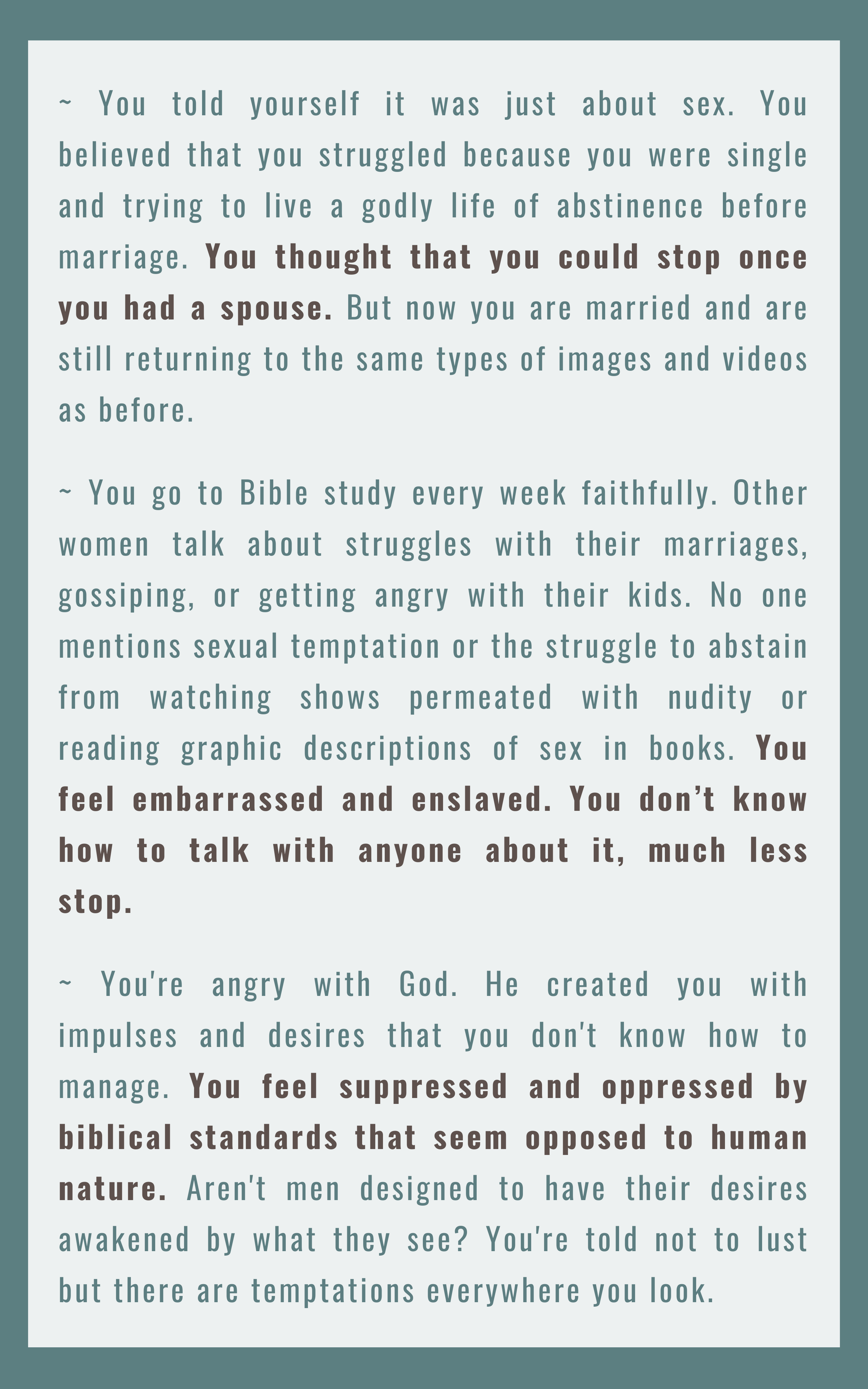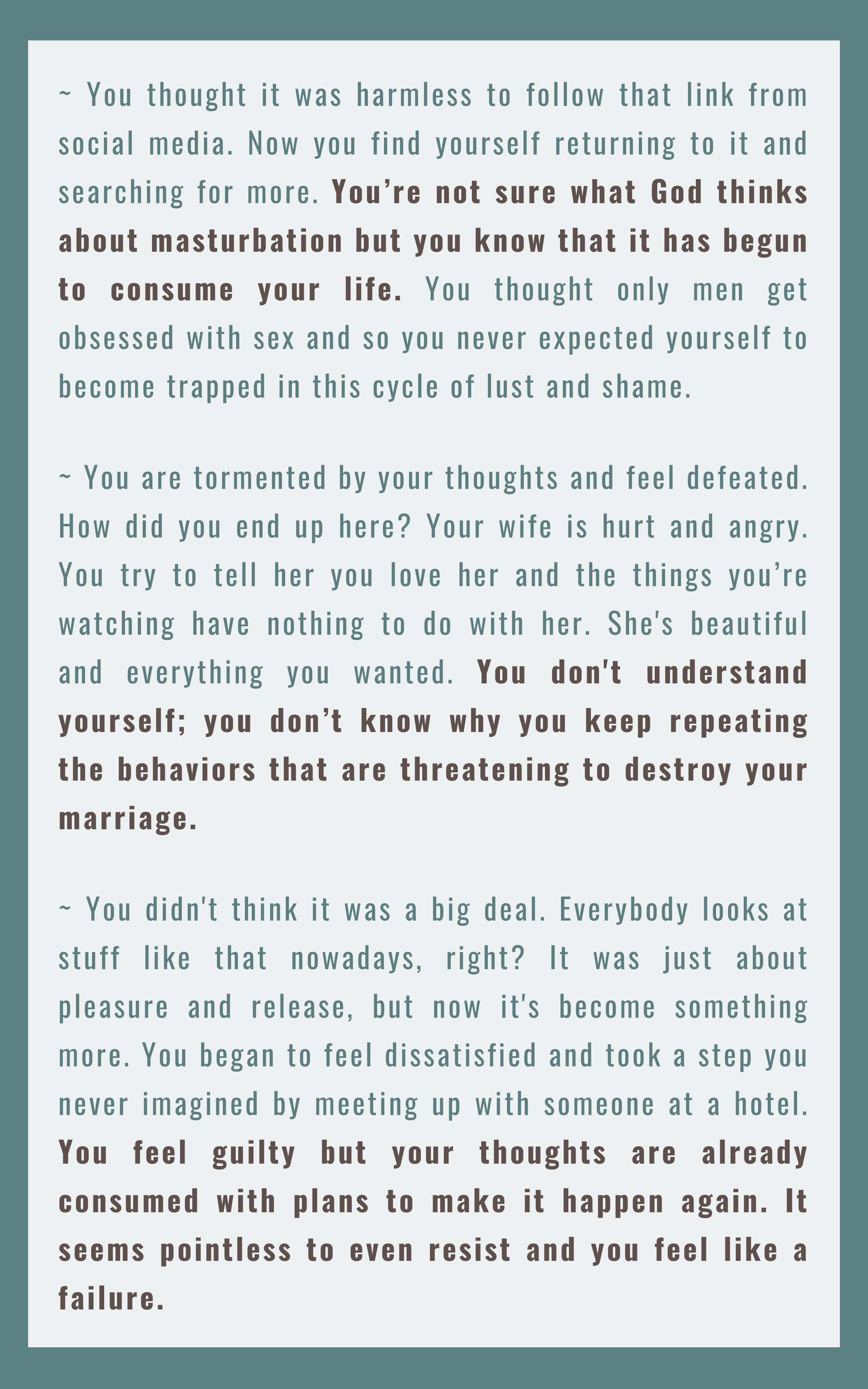Sexual Addiction Recovery in Florida

There is hope for recovery!
Do you use sex to cope with stress, loneliness, or emotional pain? Have affairs, pornography, or online relationships destroyed your marriage? Have you tried to change but feel powerless after many failed attempts? If so, you are not alone.
In a world where pornography and sexually explicit content is right at our fingertips, we are facing an epidemic of sexual enslavement. Both men and women are being impacted. People of faith and those without faith are facing similar challenges and struggling to overcome.
Many studies suggest that approximately two-thirds of Christian men and one-third of Christian women view pornography at least monthly. The majority of boys and girls are exposed to online sexual content before reaching adulthood. The secrets and shame surrounding sexuality are destroying souls and families. In spite of this, we maintain boundless hope for you and the possibility of your recovery.
Take heart! We believe that your wounds can be healed and we are not here to shame or condemn you. We invite you to step into the light, where you will encounter a non-judgmental therapeutic relationship, the grace of the Lord Jesus Christ, the love of God, and the partnership of the Holy Spirit to lead you in recovery. You can express and experience healthy sexuality according to God’s plan for you!
"What is sexual addiction?”
Sexual desire is not inherently sinful.
God created our bodies to crave and seek to satisfy our cravings. Just as hunger is meant to inspire our pursuit of food that will fuel and energize our bodies, sexual desire is meant to inspire our pursuit of relationships. God designed both food and sex to also be pleasurable. If you are a healthy, happy, fulfilled person, you will most likely enjoy this pleasure, while also recognizing that it is satisfying your deepest desires (for nutrition or connection).
Conversely, if you are living with trauma, pain, emptiness, mental chaos, loneliness, anxiety, or anything else that makes you frequently feel at dis-ease within your own body, you are at a greater risk of overvaluing this pleasure and coming to believe that it will satisfy you. If sex or food (or drugs, alcohol, relationships, etc.) ease your pain/discomfort, giving you a sense of peace and pleasure that you rarely experience, it is understandable that you would crave whatever altered your reality. However, when pleasure or pain relief becomes the main object of our pursuit, food and sex can harm, rather than benefit our bodies, minds, and souls.
Individuals who perceive the dis-ease they experience to be out of their control, due to a physical or mental illness/injury, often find relief when they encounter a behavior or substance that they can control and use to ease their mental or emotional pain/discomfort. If your stomach hurts because you are hungry but it feels better when you eat, it’s reasonable that you would enjoy eating. If you feel lonely and insecure, but you feel connected and desirable when you have sex, it makes perfect sense that you would enjoy having sex.
Both food and sex can be used to control and manage pain.
When our consumption of food or engagement in sex is excessive or unhealthy, the reward systems in our brains can be rewired and begin to control us. We start to crave types of food and sexuality that serve as pain relievers with disastrous side effects. Rather than food fueling our bodies, it can deplete our energy. Rather than sex forging healthy connections, it can create chasms between us and others. The good things God made can become captors that enslave. And when this happens, we need help, healing, and recovery.
There are many ways to understand sexual addiction and the analogy above is only one of those ways. Every individual has their own story that has led them to their present circumstances. This is why we have a team of therapists that are equipped with various treatment approaches. As a starting point, we would like to offer you some information that we hope will help you to determine your next step.
“What is the difference between sexual indulgence and sexual addiction?”
Engaging in sexual activity that doesn’t align with your values or belief system does not automatically mean that you are contending with sexual addiction. It is possible to indulge in expressions of sexuality that you believe to be sinful without it being an addiction. In fact, two people can be taking the same actions, with one’s behavior reflecting sexual indulgence and the other’s behavior being motivated by sexual addiction.
Addiction can be distinguished from indulgence based on control and impact on daily life:
What are possible symptoms of sexual addiction?
Preoccupation with sexual thoughts, fantasies, or activities that overshadow other important aspects of life
Engaging in sexual behaviors in secret or feel a strong need to hide your actions from others
Repeated unsuccessful attempts to reduce or stop the behavior
Behavior that persists despite negative consequences, such as feelings of shame, relationship problems, financial difficulties, or health issues
Using sexual activity as a way to cope with emotional pain, stress, or trauma
Using sexuality to avoid emotional distress, increase self-esteem, or seek validation
“Which factors may put someone at greater risk of developing an addiction?”
Poor impulse control, risk-taking behaviors, and challenges in managing emotions, including ADHD
Individuals who struggle with obsessive thoughts or compulsive behavior, such as those with OCD
Limited emotional regulation or healthy coping strategies for pain and/or discomfort
Unresolved trauma or abuse
Exposure to sexual content, particularly at a young age
Low self-esteem
Anxiety or depression
“What can you expect if you speak to a Boundless Hope therapist about the possibility of having a sexual addiction?”
When you speak with either Nigel Bryant or Mitchell Zak, Boundless Hope therapists that are skilled in supporting your recovery, about the possibility of having a sexual addiction, you can expect a compassionate and multi-dimensional approach to your healing. They understand that addiction is a complex issue that impacts many aspects of life—physical, emotional, mental, spiritual, and relational health. Their goal is to support your overall well-being by addressing each of these areas in a way that resonates with your personal needs and experiences.
Either Nigel or Mitchell will take a trauma-informed approach, meaning that they help you explore past wounds and the false beliefs about yourself that may have developed over time. By identifying these deeper issues, they can help you better understand the behaviors connected to sexual addiction. They also assess for any co-existing conditions such as depression, anxiety, or other addictions that may be contributing to your struggles. They are eager to collaborate with your other medical professionals, such as doctors or psychiatrists, to ensure a comprehensive treatment plan.
If faith is important to you, your therapist can integrate spiritual practices and beliefs into your healing journey. However, they will never pressure you to incorporate faith-based approaches. While the Twelve Steps are rooted in spiritual principles, your recovery path should align with what feels right for you. Active participation in recovery groups can be beneficial, but it will always be a personal choice. There are many paths to healing.
At Boundless Hope, we do not view sexual addiction as simply a sin or a moral failing. We understand that it’s a complex issue that cannot be resolved by just telling someone to stop, read the Bible, or pray harder. Our approach is never about shaming or motivating you through guilt, as we know these only fuel addiction further. Instead, we focus on helping you uncover and understand the underlying issues driving your behaviors. True healing comes from addressing these core issues, not merely changing your actions.
Ultimately, our work together will center on creating a safe, non-judgmental space where you can heal and grow, free from shame or guilt, with guidance and support that meets you where you are. We would love to walk with you through your recovery journey.








